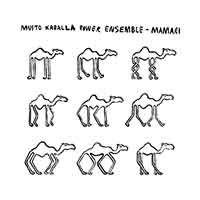Muito Kaballa Power Ensemble - Mamari
 Muito Kaballa Power Ensemble is een negenkoppige formatie uit Keulen rond tenorsaxofonist Niklas Mündermann en pianist Jan Janzen. Niklas begon zijn muzikale carrière als straatmuzikant, waarbij hij al snel de aandacht trok met zijn capriolen op zijn loop station of looper (live-looping is het opnemen en afspelen van stukjes muziek in real-time door gebruik te maken van specifieke hardware-apparatuur, bekend als loopers of phrase samplers). Na de release van zijn debuutalbum Everything Is Broke in 2019, vond Niklas het echter tijd om andere muzikale paden te gaan bewandelen, en nadat hij pianist Jan Janzen tegen het lijf liep, werd al snel besloten om een heuse band te vormen. Op Mamari, de nieuwe dubbel-LP vol Afro-jazz, afrobeat, Afro-groove, Afro-Cubaanse invloeden en meer, hoort u naast Niklas (tenorsaxofoon, flute en synth) en Jan (toetsen) dan ook Nora Beisel op vocalen, André van der Heide op drums, Leonard Gaab op percussie, Lilli Thomas op trompet, Till Weise op bas, Benjamin Schneider op gitaar en Tim von Malotki op baritonsaxofoon.
Muito Kaballa Power Ensemble is een negenkoppige formatie uit Keulen rond tenorsaxofonist Niklas Mündermann en pianist Jan Janzen. Niklas begon zijn muzikale carrière als straatmuzikant, waarbij hij al snel de aandacht trok met zijn capriolen op zijn loop station of looper (live-looping is het opnemen en afspelen van stukjes muziek in real-time door gebruik te maken van specifieke hardware-apparatuur, bekend als loopers of phrase samplers). Na de release van zijn debuutalbum Everything Is Broke in 2019, vond Niklas het echter tijd om andere muzikale paden te gaan bewandelen, en nadat hij pianist Jan Janzen tegen het lijf liep, werd al snel besloten om een heuse band te vormen. Op Mamari, de nieuwe dubbel-LP vol Afro-jazz, afrobeat, Afro-groove, Afro-Cubaanse invloeden en meer, hoort u naast Niklas (tenorsaxofoon, flute en synth) en Jan (toetsen) dan ook Nora Beisel op vocalen, André van der Heide op drums, Leonard Gaab op percussie, Lilli Thomas op trompet, Till Weise op bas, Benjamin Schneider op gitaar en Tim von Malotki op baritonsaxofoon.
Het titelnummer van het album werd gecomponeerd door bassist Till Weise: "When I first wrote Mamari, I wanted to create a song that I could play alone while singing along to it. Mamari is a song with a groove heart that moves forward fast and, at the same time, stumbles. Like riding a bike with bent wheels or the way a camel moves, which is called the pace gait or mamari in Arabic!" (zie ook het hoesontwerp van het album, waarop een dromedaris in verschillende poses staat afgebeeld).
Nummers als Chung, Marokkaanse gnawa meets hip-hop en jazz, en 'Tin Tin', dat in de tweede helft losbreekt in een mix van Afro-Cubaanse grooves en cumbia, waren ook al terug te vinden op Everything Is Broke, maar werden herwerkt voor de nieuwe line-up. Aga Aga, Mali blues met Afro-Cubaanse invloeden, verwijst dan weer naar de Aggertalsperre, een stuwmeer vlakbij Keulen, waar percussionist Leonard Gaab bijna verdronk in het ijskoude water. Met There's Always Sun, één van de weinige vocal tracks op Mamari, probeert de band om ons tijdens deze moeilijke periode ook de mooie kant van het leven te laten zien. Ook in Don't Go Too Far, lekker stevige afrobeat en voor de band een manier om hun frustraties en woede over bepaalde socio-politieke problemen om te zetten in muziek, is de stem van Nora Beisel te horen.
Tenslotte mogen we ook zeker Curupira, de tweede single, niet vergeten te vermelden, want eigenlijk gaat achter dit nummer een hele ecologische boodschap schuil: "The Curupira is a mythological creature that was known for being able to communicate with the inhabitants of the forest, notably alarming them about danger. With this song we want to alarm you, and ourselves. We need to understand that there is no Curupira, it's all on us. Curupira lives inside each and everyone of us. We need to let it out and fight for climate justice together. The song starts with the sounds of an awakening rainforest slowly flowing into a lively groove of the jungle, musically depicting all its power and diversity. However, the forest is burning and we are calling Curupira to come help us. The baritone solo depicts the arrival of the demonic figure. The jungle sounds reappear, but are quickly drowned out by the arrival of humans and the sounds of machines cutting the trees. Vocals and spoken word by Nora Beisel.". In die context gaat 500€ van de opbrengst van deze dubbel-LP dan ook naar Resgate Climático, een herbebossingsproject in de staat Bahia in Brazilië.
Prima plaat van deze Duitse band met oog voor de sociale en ecologische problemen die de wereld vandaag in hun greep houden.
www.rebelup.org